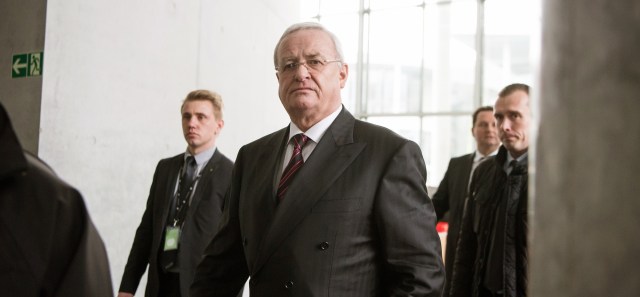Martin Winterkorn, former CEO of Volkswagen. Credit: Bernd von Jutrczenka/dpa

Two pieces of good news for the health of the capitalist system have emerged in the last few days. The most important came on Friday, when US prosecutors announced they would be charging six individuals, including the former CEO Martin Winterkorn, for their alleged role in facilitating or covering up the German car giant’s decade-long cheating of environmental regulation of emissions.
US Attorney General John Sessions declared: “If you try to deceive the United States, then you will pay a heavy price. The indictment unsealed today alleges that Volkswagen’s scheme to cheat its legal requirements went all the way to the top of the company. These are serious allegations, and we will prosecute this case to the fullest extent of the law.”
Over the weekend, the former top dogs at VW were probably comforting themselves with the thought that, even if found guilty, they’d never face practical consequences as – quite unbelievably – Germany does not have an extradition agreement with the country that for 70 years has both underwritten its defence and, more generally, the world trading system of which it has been such a disproportionate beneficiary. But I’m digressing.
Today, they may feel less comfy. For yesterday we learnt that VW itself may well sue its former top employees in an attempt to exact punishment for the estimated $25 billion cost of the compensation and other bills that the scandal led to. Call me cynical, but I wonder if there’s more than a trace of PR in this. It is, after all, in VW’s interest to present itself as a victim of a few bad apples and that its corporate culture and its commercial closeness to the German government have also been full contributors to the rot.
As Jack Ewing – European economics journalist for The New York Times and author of a book on the scandal – told UnHerd last year, there was an unhealthiness to the depth, breadth and length of Berlin’s support for VW’s targets to lead the world in volume of car production. “If you look back at the last couple of decades,” he told Harriet Maltby, “time and again the German government went to bat for the German car industry and that led to this very weak regulatory structure.”
I’m pleased at the potential double action for two reasons. One is that it’s helpful in addressing widespread suspicion among voters that the wealthy and well-connected do not play by the same rules as them. The Transatlantic YouGov poll with which UnHerd launched last July confirmed the electoral toxicity of bad behaviour from big business. Our surveys found that only “one in twenty Britons thinks the level of punishment [for those responsible for the crash of 2008] has been appropriate, while it’s just over one in ten among Americans”. When banks failed – hurting taxpayers, shareholders and generating austerity and unemployment – too many CEOs landed far too softly.
But there’s an even more fundamental reason why it matters that bad practice should be seen to carry consequences. Consequences are, after all, at the heart of why competitive free markets are so innovative. And consequential losses at least as much as consequential profits. Like a mild heart attack, dropping into the red is a flashing light on the dashboard – a warning that a change of course is necessary or the next bank statement or next coronary could be fatal.
The contrasting reactions of business people to a project veering off track (especially those running start-ups and with their personal finances at stake) compared with the reactions of politicians is why market economies are usually superior to politician-driven economies. Democratically-elected leaders and ministers are intensely aware that abandoning a project – perhaps promised at an election – after “wasting” taxpayers’ money can carry a significant political price. Operating in the lopsided media culture in which successful initiatives get little or no attention from journalists, there is every incentive for sloppily-designed or even fundamentally misconceived projects to be given life beyond their sell-by date and for good money to be thrown after bad.
When fear of loss is diminished, market economies risk losing their dynamism. While some worthwhile innovations do get grants, it’s also an environment in which bad practice, poor management and even cavalier deployment of scarce resources go unpunished.
And if you are looking for business folk who are among the most insulated from the ‘loss motive’, I’d nominate top CEOs (and – as we’ve painfully learnt – the too-big-to-fail bankers whose actions are underwritten by the public purse). For most CEOs they are playing a game that is not snakes and ladders. Their win-win game is ladders and ladders.
Time and again we see that if a CEO does hit targets, the telephone number packages are delivered as promised. If, however, the choices end in disaster or even illegality, the termination arrangements tend to resemble welfare safety-nets, not market-signalling-snakes.
Golden goodbyes defy all historical precedents, economic rationales and popular moral norms. But they make it easier for the board members who authorise them to look their dispensed-with chums in the eye when they see them at the opera or the tennis.
What we have seen here, with the treatment of the most senior former managers at VW, are steps being taken towards tackling those cosy cultures within boardrooms and between big companies and big government which have disconnected CEOs from any negative consequences of decisions they take. The steps are small but vital ingredients for the effectiveness and popular legitimacy of free market capitalism.










Join the discussion
Join like minded readers that support our journalism by becoming a paid subscriber
To join the discussion in the comments, become a paid subscriber.
Join like minded readers that support our journalism, read unlimited articles and enjoy other subscriber-only benefits.
Subscribe